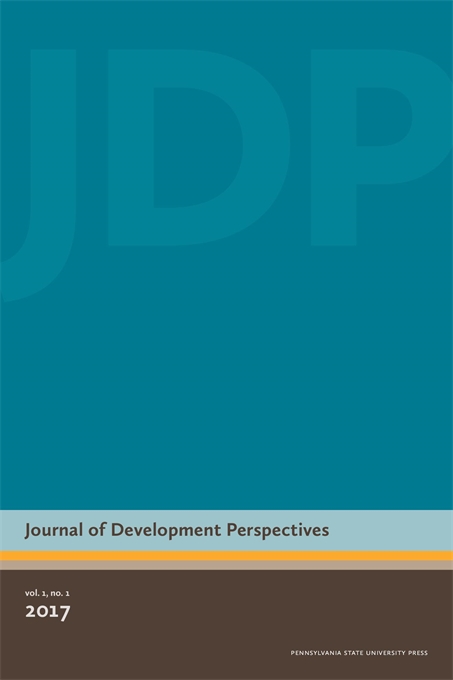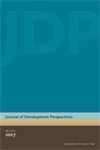
Journal of Development Perspectives
Johannes Fedderke, Editor in Chief
Biniam Bedasso, Editor
Manoel Bittencourt, Editor
Željko Bogetić, Editor
Terrence Guay, Editor
Uma Kambhampati, Editor
Edouard Mensah, Editor
Mare Sarr, Editor
Kaj Thomsson, Editor
Sechindra Vallury, Editor
Journal of Development Perspectives
Johannes Fedderke, Editor in Chief
Biniam Bedasso, Editor
Manoel Bittencourt, Editor
Željko Bogetić, Editor
Terrence Guay, Editor
Uma Kambhampati, Editor
Edouard Mensah, Editor
Mare Sarr, Editor
Kaj Thomsson, Editor
Sechindra Vallury, Editor
- Description
- Board
- Submissions
- Pricing
- ToC
Access current issues through Scholarly Publishing Collective.
Challenges of economic and social development are, by their nature, diverse. They cover the coordination of action through social and political institutions, as well as actions of individuals and of organizations. Its welfare dimensions are also broad, ranging from narrowly defined economic interests to broader conceptions of human progress. Constraints and enabling mechanisms arise from both human agency, and the environment within which humans exercise their agency. Inevitably, this means that a range of disciplines are relevant to scholars interested in development, from the social sciences such as economics, political science, and sociology, through management disciplines, and an ever-increasing set of the natural sciences, from genetics to environmental sciences and beyond. Following relevant progress across such a wide array of disciplines, each with their specific sets of methodologies and styles of presenting evidence and assessing its robustness, is non-trivial in and of itself, and made more challenging by ever-increasing specialization in each area of enquiry.
The Journal of Development Perspectives intends to provide an opportunity for scholars interested in development to contribute to improved communication across disciplines. It does so by providing a platform both for the publication of new research findings presented in a manner accessible to a generalist audience, and by actively encouraging synoptic assessments of the state of knowledge in areas of interest to scholars of development. In doing so, it invites contributions from all disciplines that are relevant to development questions.
CALL FOR PAPERS - See Submissions for details:
1. Special Issue: Finance, Business Cycle and Economic Growth in Developing Countries.
2. Special Issue: Central Bank Independence and Macroeconomic Performance in Developing Countries.
3. Special Issue: The Geography of Women’s Labour Force Participation.
4. Special Issue: Multinational Enterprises and Developing Countries.
Editor in Chief
Johannes Fedderke, The Pennsylvania State University, US
Editors
Biniam Bedasso, Centre for Global Development, US
Manoel Bittencourt, University of Pretoria, ZA
Željko Bogetić, The World Bank, US
Terrence Guay, The Pennsylvania State University, US
Uma Kambhampati, University of Reading, UK
Edouard Mensah, The Pennsylvania State University, US
Mare Sarr, The Pennsylvania State University, US
Kaj Thomsson, University of Maastricht, NL
Sechindra Vallury, University of Georgia, US
Managing Editor
Astrid Meyer, The Pennsylvania State University, US
Articles are normally solicited by the editors of the journal, though proposals for topics can be directed to the journal office jdp@press.psu.edu.
If you would like to submit an article to Journal of Development Perspectives, please visit http://www.editorialmanager.com/jdp and create an author profile. The online system will guide you through the steps to upload your article for submission to the editorial office. Refer to the submission guidelines here or view them on the submission site in the About section in the navigation bar, before submitting your manuscript:
1. Special Issue: Finance, Business Cycles and Economic Growth in Developing Countries
Editor: Manoel Bittencourt, University of Pretoria, email: manoel.bittencourt@up.ac.za
Background and scope:
This special issue seeks to fill a gap between the general interest press and most other academic economics journals. The issue aims to publish articles that will serve several goals: to synthesize and integrate lessons learned from active lines of economic research in finance, the business cycle and economic growth in developing countries; to provide analysis of related public policy issues; to encourage cross-fertilization of ideas among the fields of finance, the business cycle and economic growth; to offer readers an accessible source of state-of-the-art economic thinking on the subject; and to suggest directions for future research.
Submission topics:
• financial factors (balance sheets) in recessions
• finance and business cycles
• heterogeneity/inequality (micro data availability) and macroeconomic shocks
• finance and entrepreneurship
• financial development and economic growth
• financial regulation
In addition to empirical papers that establish causal relationships, we welcome descriptive studies, literature reviews, and replications that significantly enhance our collective comprehension of the above themes.
Submission details:
• submission deadline: initial submissions must be received by December 31th, 2025 via the journal submission portal at http://www.editorialmanager.com/jdp.
• peer review: submitted manuscripts will undergo the standard peer-review process.
• We invite scholars from diverse research methodologies to contribute to this special issue.
For questions or to explore the suitability of a research topic or paper for this special issue, please contact the issue editor: Manoel Bittencourt, University of Pretoria, email: manoel.bittencourt@up.ac.za
2. Special Issue: Central Bank Independence and Macroeconomic Performance in Developing Countries
Editor: Manoel Bittencourt, University of Pretoria, email: manoel.bittencourt@up.ac.za
Background and scope:
This special issue seeks to fill a gap between the general interest press and most other academic economics journals. The issue aims to publish articles that will serve several goals: to synthesize and integrate lessons learned from active lines of economic research in central bank independence dynamics and macroeconomic performance in developing countries; to provide analysis of related public policy issues; to encourage cross-fertilization of ideas among the fields of central bank independence and macroeconomic performance; to offer readers an accessible source of state-of-the-art economic thinking on the subject; and to suggest directions for future research.
Submission topics:
• inflation and macroeconomic performance
• institutional development (e.g. redemocratization) and inflation
• central bank independence and inflation
• institutional development and central bank independence over time
• central bank independence and macroeconomic performance
• financial regulation
In addition to empirical papers that establish causal relationships, we welcome descriptive studies, literature reviews, and replications that significantly enhance our collective comprehension of the above themes.
Submission details:
• submission deadline: initial submissions must be received by December 31st, 2025 via the journal submission portal at http://www.editorialmanager.com/jdp.
• peer review: submitted manuscripts will undergo the standard peer-review process.
• We invite scholars from diverse research methodologies to contribute to this special issue.
For questions or to explore the suitability of a research topic or paper for this special issue, please contact the issue editor: Manoel Bittencourt, University of Pretoria, email: manoel.bittencourt@up.ac.za
3. Special Issue: The Geography of Women’s Labour Force Participation
Editors: Uma Kambhampati and Niaz Asadullah, University of Reading
This special issue explores the varied patterns of women’s labor force participation in the Global South. It seeks insights into regional disparities, positive deviance, and emerging trends, with a focus on South Asia, MENA, and Southeast Asia.
Background and scope:
Girls’ enrollment in schools and women’s literacy rates have increased in most countries of the world during the MDG era. Increase in women’s engagement in labor markets has been much slower to relative growth in female schooling, causing international variation withing developing Asia. The average rate of women’s labor force participation in South Asia and MENA is 28% and 18%, respectively, compared to a much higher 58% in East Asia and the Pacific. Moreover, there are instances of positive deviance. In Southeast Asia, female labor force participation rates range from a high of 68% in Vietnam to a low of 47% in the Philippines. In the MENA region, women’s labor force participation varies significantly, from 64% in Qatar to just 14% in Jordan.
Submission topics:
The special issue editors invite papers to explore why women’s labor force participation in the Global South has been so varied. What explains Southeast Asia’s relatively high female labor force participation rates? Conversely, why has women’s employment stagnated in South Asia and MENA despite the rise in female education? Are there emerging cases of positive deviance at the country level? Why is women’s employment so low in India? Have Saudi Arabia’s recent policy changes positively impacted women’s employment? To what extent are these patterns shaped by persistent gender norms? Alternatively, is the structure and growth of certain economies reinforcing low participation rates for women?
Submission details:
Submission deadline: initial submissions must be received by December 31th, 2025
Peer review: submitted manuscripts will undergo the standard peer-review process.
Submit your article to http://www.editorialmanager.com/jdp.
For questions or to explore the suitability of a research topic or paper for this special issue, please contact the issue editors: Uma Kambhampati, at u.s.kambhampati@reading.ac.uk and Niaz Asadullah m.asadullah@reading.ac.uk
4. Special Issue: Multinational Enterprises and Developing Countries
Editor: Terrence Guay, Pennsylvania State University, email: trguay@psu.edu
Background and scope:
This special issue seeks to assess the impact of multinational enterprises (MNEs) on developing countries. In 2004, Klaus E. Meyer published “Perspectives on multinational enterprises in emerging economies” (Journal of International Business Studies, 35, 259-276). In that seminal article, Meyer encouraged scholars “to engage in research on positive and negative spillovers from foreign direct investment (FDI) in emerging economy societies.” The global business environment has experienced significant changes and disruptions over the past two decades, and it is timely to assess how these factors have shaped the wide-ranging influence of MNEs on developing countries. This issue of Journal of Development Perspectives aims to publish 6-8 articles that advances our understanding of this theme from a variety of disciplinary perspectives. In addition to empirical papers that establish causal relationships, we welcome descriptive studies, literature reviews, case studies, or cross-country/regional comparisons that significantly enhance our collective comprehension of the above theme.
Possible submission topics:
• Impact of MNEs on the politics of developing countries, including corruption and democratization
• Impact of MNEs on developing countries’ economies, such as domestic competition and industry diversification
• Impact of MNEs on technology transfer and innovation in developing countries
• Impact of MNEs on developing countries’ societies, including inequality and participation by women in the workforce
• Impact of MNEs on environmental issues and sustainable development
• How the nationality of MNEs, particularly those from “great powers,” impacts the domestic environment or external relations of developing countries
Submission details:
• submission deadline: initial submissions must be received by January 31th, 2026 via the journal submission portal at http://www.editorialmanager.com/jdp.
• peer review: submitted manuscripts will undergo the standard peer-review process.
• We invite scholars from diverse research methodologies to contribute to this special issue.
For inquiries and submission:
For questions or to explore the suitability of a research topic or paper for this special issue, please contact the issue editor: Terrence Guay, Pennsylvania State University, email: trguay@psu.edu
Institutional Online - $159.00
Institutional Print - $166.00
Institutional Online & Print - $232.00
Institutional Single Issue - $89.00
Individual Online - $46.00
Individual Print - $48.00
Individual Online & Print - $66.00
Individual Single Issue - $32.00
Outside US add Shipping & Handling - $13.00
FORTHCOMING TABLE OF CONTENTS
VOLUME 6 – Special Issue: Socio-economic and environmental implications of climate-smart agriculture in developing countries.
Editors: Mare Sarr, Pennsylvania State University; Edouard Mensah, Pennsylvania State University; Sechindra Vallury, University of Georgia; Ange Kakpo, Seattle Pacific University; Martin Paul Jr Tabe Ojong, World Bank
Rethinking Resilience: Lessons from Climate-Smart Innovation in African Agriculture
Mare Sarr, Edouard Mensah, Sechindra Vallury
The dynamics of (dis)adoption of climate-smart agriculture innovations in Sub-Saharan Africa: Evidence of the Smart-valley rice technology using panel data in Benin
Aminou Arouna, Dagbegnon Armand Tossou
Economy-wide effects of climate-smart agriculture in Ghana: the case of Cereal-Legume Integration Plan
Richard Kwabi Ayisi, Simon Bawakyillenuo
Impact of Certified Seed Adoption on Rice and Millet Yields in Senegal: A Propensity Score Matching Approach
Waounde Diop, Thierno Thioune
The Promise with Sustainable Pastoral Intensification Practices: Evidence from Kenyan arid and semi-arid areas
S. Wagura Ndiritu, Arnold Muthanga, Mwalya Wambua
Boosting climate-smart smallholder farm strategies and household outcomes through joint decision-making, by men and women, in agrarian households in arid Namibia
Mintewab Bezabih, Byela Tibesigwa, Martine Visser
Mailing List
Subscribe to our mailing list and be notified about new titles, journals and catalogs.



